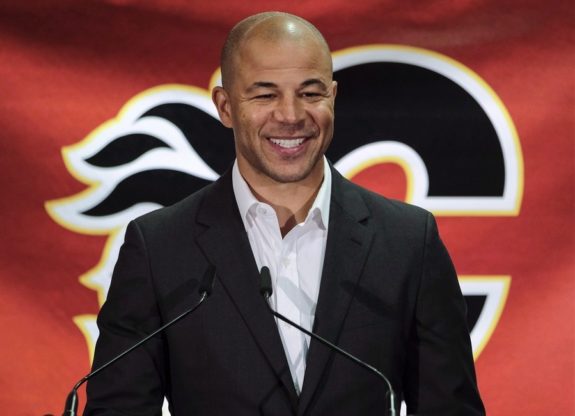In December 1995, the Calgary Flames traded Joe Nieuwendyk to the Dallas Stars for Corey Millen and a promising junior player. Roughly 23 years later, the Flames will honour that junior player – Jarome Iginla – by retiring his jersey number in a pre-game ceremony at the Scotiabank Saddledome.

For a club that, at times, has grappled with the proper manner in which to honour its history and the players that defined the franchise, the announcement of the March 2, 2019 ceremony was both the simplest and smartest move available. Sending number 12 to the rafters is the best possible way to honour the best player in Flames history.
The Flames’ Mount Rushmore
Dating back to the Atlanta Flames days, four players have essentially defined the franchise and been representative of the team’s progression and identity: Kent Nilsson, Lanny McDonald, Theoren Fleury and Jarome Iginla. (Current captain Mark Giordano is currently making a strong argument to become this group’s fifth member.)
- Nicknamed “the Magic Man,” Nilsson joined the Flames in the 1979-80 season and brought an offensive swagger that was previously absent from an up-and-coming Flames group. His 131-point performance in 1980-81 is still a franchise record.
- The Alberta-born McDonald returned to his home province via a 1981-82 trade with the Colorado Rockies and became the heart and soul of a late ’80s powerhouse. His 66 goals in 1982-83 are still a record and while he wasn’t their most talented piece, but nobody was more important to their success than McDonald.
- A unique talented pest drafted late in the 1987 NHL Draft, Fleury was one of the few reasons to watch the Flames in the 1990s. He might not have been the most consistent players in the game, but his compete level was second to none.
Iginla joined a very lean Flames team in the mid-’90s and ultimately had a better run with the Flames than any player that came before him. He won individual awards for his own excellence, and he was instrumental in the 2004 Stanley Cup Final run that rejuvenated the franchise and made the Flames the hottest ticket in town for a few seasons. The best player on the team (and occasionally in the league) during a four or five season stretch that brought the team back to relevance, Iginla was the most important player in Flames history.
Forever A Flame Or Retiring a Number?
When Iginla retired in July 2018, the most common fan question was some variation of “Are the Flames going to retire his number?” The question had two inquiries built into it: would the team honour him, and would they do it in the right way? The Flames had most recently honoured a pair of longtime Flames – Al MacInnis and Joe Nieuwendyk – into the Forever A Flame program that kept their numbers in circulation, and there were some anxieties that future players would be able to do Iginla’s number 12.
Two factors made that an unlikely possibility. Both numbers in the Forever A Flame program haven’t been used in recent years; MacInnis’ 2 hasn’t been worn since 2003-04 and Nieuwendyk’s 25 is currently unassigned. When the numbers are treated with enough reverence that they’re effectively retired anyway, it serves much of the same purpose.
The club has also seemingly used a simple test to determine if a player should have their number retired or merely “honoured”: was the player’s career important to the franchise, and was the franchise important to the player’s career? Both MacInnis and Nieuwendyk spent more time away from the Flames than with them, and both built up very impressive resumes with other teams – MacInnis won his Norris Trophy as a St. Louis Blue, while Nieuwendyk won Stanley Cups with the Dallas Stars and New Jersey Devils. While both players were important to the club, neither were as synonymous with the Flames as McDonald, Vernon or Iginla were.
IGGY!
The #Flames will retire Jarome Iginla's #12 jersey on Mar. 2! https://t.co/qUAjnkAvdi
— Calgary Flames (@NHLFlames) January 17, 2019
In that sense, Iginla’s number being retired was seemingly inevitable – but it’s also the simplest, most meaningful way to honour the player’s legacy.
Next Stop: The Hockey Hall of Fame
Since Iginla played his last professional game in 2016-17, he’ll be eligible for induction into the Hockey Hall of Fame in 2020. While the term is often bandied about, he’s the living definition of a “first ballot” Hall of Famer as a player who was excellent over a lengthy playing career.
- He’s 16th in NHL history in goals
- He’s 34th in NHL history in points
- He’s won several key individual awards, including a scoring title and two goal-scoring titles
- He’s won several key team awards at various levels of hockey (everything except the Stanley Cup)
While Iginla’s number retirement will be a watershed moment for the Flames and the player alike, his inevitable Hall of Fame induction makes it likely that it won’t be the last time the club tips their collective hat to their best player ever.